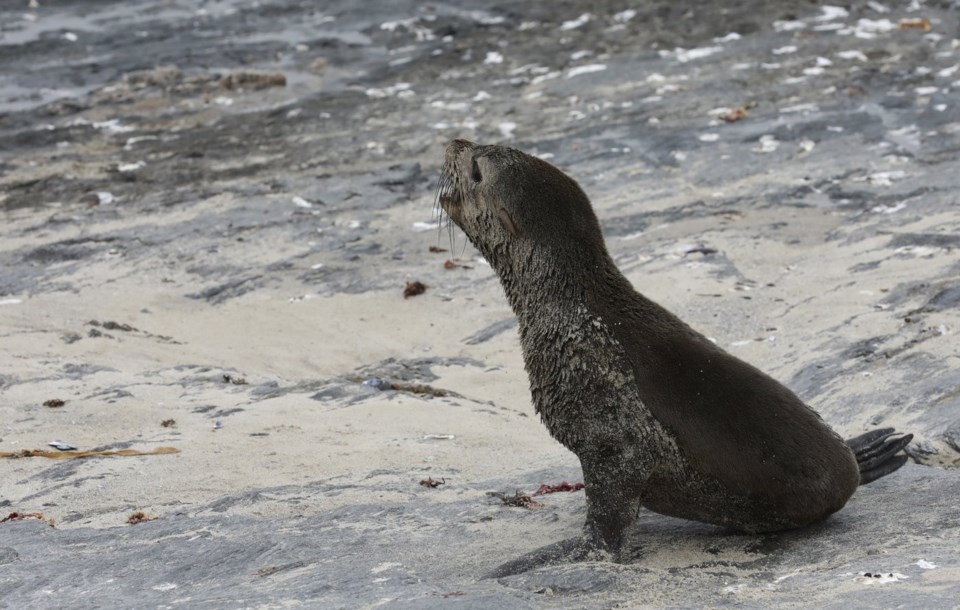CAPE TOWN, South Africa (AP) — Scientists in South Africa say they have identified an outbreak of in seals that is believed to be the first time the virus has spread in sea mammals.
At least 24 Cape fur seals that were found dead or euthanized in various locations on South Africa's west and south coast had rabies, state veterinarian Dr. Lesley van Helden said.
Rabies, which affects mammals and , is almost always fatal once symptoms appear. Rabies spreads via saliva, usually through bites but also sometimes when animals lick and groom each other.
The virus has long been seen in wild animals such as raccoons, coyotes, foxes, jackals and in domestic dogs. But it had never been recorded spreading among marine mammals, van Helden and other experts said this week.
The only other known case of rabies in a sea mammal was in a ringed seal in Norway's Svalbard islands in the early 1980s. That seal had likely been infected by a rabid arctic fox, researchers said, and there was no evidence of rabies spreading among seals there.
Authorities in South Africa first discovered rabies in Cape fur seals in June after a dog was bitten by a seal on a Cape Town beach. The dog became infected with rabies, prompting rabies tests on brain samples from 135 seal carcasses that researchers had already collected since 2021. Around 20 new samples also were collected and more positives have come back on subsequent tests.
Scientists are trying to work out how rabies was passed to the seals, whether it is spreading widely among their large colonies and what can be done to contain it.
“It’s all very, very new," said Greg Hofmeyr, a marine biologist who studies seals in South Africa. “A lot of research is required ... there are a lot of unknowns here.”
There are approximately 2 million seals migrating back and forth between South Africa, Namibia and Angola along Africa's south and west coast. The most likely possibility, van Helden said, is that rabies was first passed onto seals by jackals in Namibia, where the wolf-like animals hunt seal pups on the coastline.
The genes of the rabies virus found in the seals matched the rabies in black-backed jackals in Namibia. It also showed rabies was being transmitted between seals, because most of the virus sequences were closely related, she said.
"So, it’s basically established itself in the seal population and it’s being maintained by them biting each other,” van Helden said.
The seals live in close proximity to people in places in South Africa, especially on beaches around the city of Cape Town. The city has issued warnings to locals, said Gregg Oelofse, Cape Town's head of coastal and environmental management.
Authorities had been mystified for the past three years by reports of excessively aggressive seals and an increase in seal attacks on people, some of whom had been bitten. No human cases of rabies have been recorded as a result.
Oelofse said that city authorities had started vaccinating the small numbers of seals at two popular Cape Town harbors, where they are considered an attraction.
One of the positive rabies tests was on a seal carcass collected in August 2022, meaning rabies had been in the seal population for at least two years, Oelofse said.
“It’s been here for a while longer than we’ve known about it,” he said.
Experts said there were still many unknowns.
It’s hard to predict long-term transmission dynamics, U.S. Centers for Disease Control and Prevention spokesman Dave Daigle said. He noted previous instances of rabies viruses winding up in new hosts and then dying out. In 2021 in the U.S., for example, gray foxes were spreading the raccoon rabies virus variant for two years, and then transmission stopped.
The U.S. public health agency is watching the situation in South Africa, but has yet to see “clear evidence that this is going to be a long-term issue," Daigle said.
Another unknown is if the vaccine will be effective in seals. It's never been tested, but experts think it should work.
There's also a logistical question, van Helden said: How do you vaccinate a significant number of seals that live largely in the ocean and migrate back and forth along a coastline that is more than 3,500 kilometers (2,170 miles) long. can be vaccinated by dropping bait that releases oral vaccines when eaten, but seals generally will only eat live fish, she noted.
South African officials have been collaborating with international experts.
Seal researcher Hofmeyr said that some other seal species come into contact with Cape fur seals and then travel to other parts of the world and that was a concern for further spread.
"The chances of that happening are very low, but the implications of that if it does happen are very important,” he said.
___
AP Africa news:
Gerald Imray, The Associated Press


